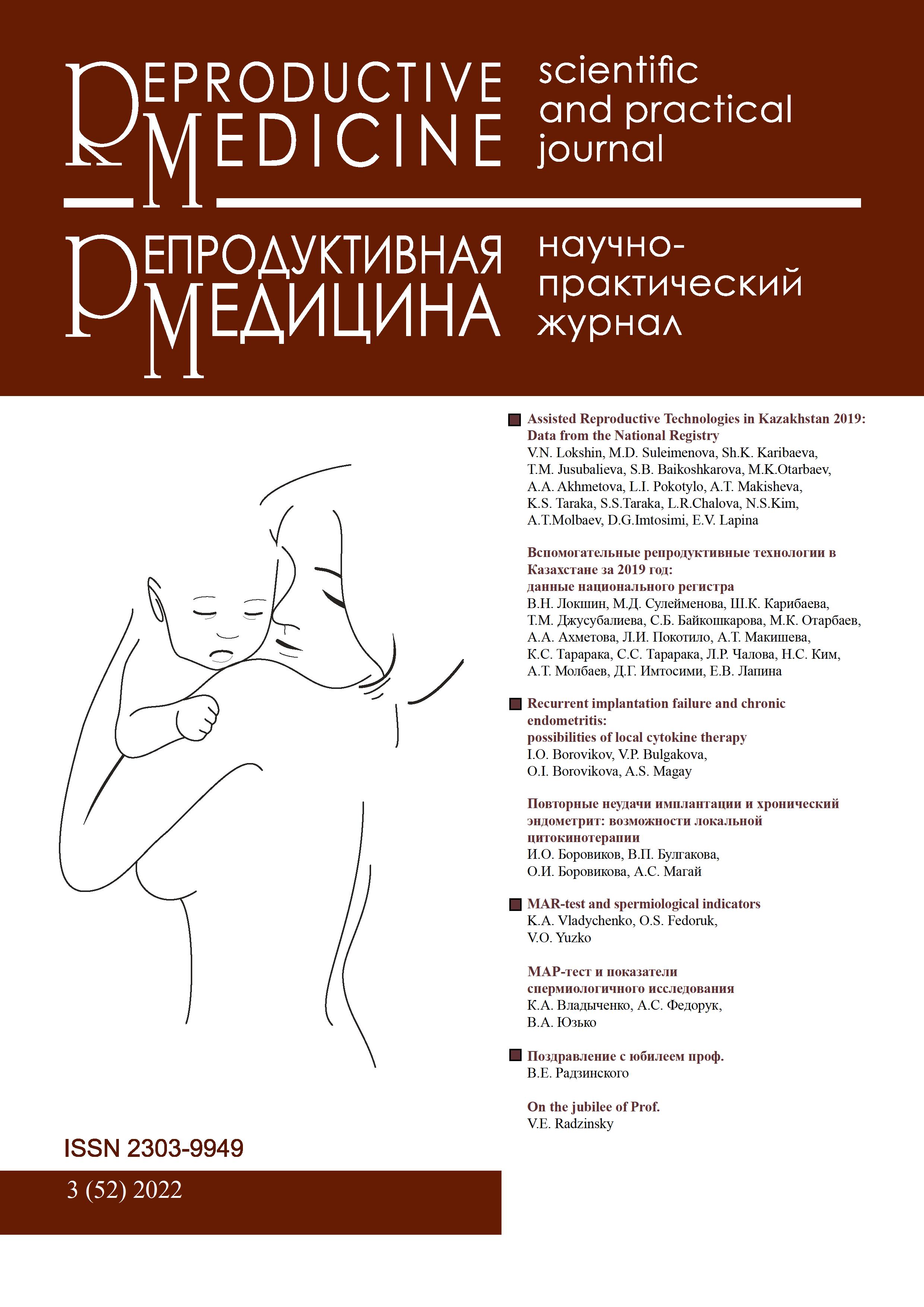Live birth of a genetically own child in a couple, where the male partner is diagnosed with reciprocal translocation
DOI:
https://doi.org/10.37800/RM.3.2022.81-86Keywords:
IVF, PGT-A, recombinant luteinizing hormone (LH), recombinant follicle-stimulating hormone (FSH)Abstract
Relevance: The presented clinical case describes treatment tactics that enabled the birth of a genetically own child in a married couple with complex anamnesis.
The purpose was to demonstrate successful pregnancy and live birth of genetically own and healthy child in a couple, where the male partner was diagnosed with reciprocal translocation in the karyotype.
Methods: The paper describes a modification of the treatment used in the two previous stimulation protocols. In particular, the superovulation was stimulated by recombinant follicle-stimulating hormone (FSH) and luteinizing hormone (LH). Each IVF program included preimplantation genetic testing for aneuploidy (PGT-A). In total, ten blastocysts were sent for genetic testing.
Results: This clinical case demonstrates a successful pregnancy and live birth of a genetically own child in the stimulation
protocols with recombinant FSH and LH. Through karyotyping, the male partner was diagnosed with reciprocal translocation between 6 and 11 chromosomes. Over three IVF attempts, we received ten blastocysts eligible for biopsy and genetic testing. PGT-A approved two blastocysts for the transfer in controlled ovarian stimulations with FSH and LH. The 2nd frozen embryo replacement was successful.
Conclusion: For some normogonadotropic women, combining the recombinant FSH with recombinant LH is an optimal strategy to obtain euploid embryos.
References
Couzinet B, Lestrat N, Brailly S, Forest M, Schaison G. 1988 Stimulation of ovarian follicular maturation with pure follicle stimulating hormone in women with gonadotropin deficiency. Journal of Clinical Endocrinology and Metabolism. 66:552–556. DOI: 10.1210/jcem-66-3-552
The European Recombinant Human LH Study Group. 1998. Recombinant human luteinizing hormone (LH) to support recombinant human follicle-stimulating hormone (FSH)-induced follicular development in LH- and FSH-deficient anovulatory women: A dose-finding study. Journal of Clinical Endocrinology and Metabolism. 83(5): 1507-1514. DOI: 10.1210/jcem.83.5.4770
Humaidan, P., Bungum, M., Bungum, L., Yding Andersen, C. 2004. Effects of recombinant LH supplementation in women undergoing assisted reproduction with GnRH agonist down-regulation and stimulation with recombinant FSH: an opening study. Reproducvite BioMedicine online. 8(6): 635 – 643. DOI: 10.1016/s1472-6483(10)61643-4
Bosch, E., Labarta, E., Crespo, J., Remohi, J., Pellicer, A. 2011. Impact of luteining hormone administration on gonadotropin-releasing hormone antagonist cycles: an age-adjusted analysis. Fertility and Sterility. 95(3): 1031-1036. doi:10.1016/j.fertnstert.2010.10.021
Фирсова Н.В., Нигматова Н.П., Сафронова К.А. А.А. Гарцман4, О.Р. Канбекова5, М.А. Балыбердина6, к.м.н. И.В. Гордеева1, д.м.н. В.Н. Щиголев. 2021. Эффективность проведения преимплантационного генетического тестирования в программах экстракорпорального оплодотворения: опыт сети клиник. Проблемы репродукции. 27(6): 115-124. DOI 10.17116/repro202127061115
Nigmatova N.P., Abdilamnova B.Zh., Schigolev V.N. 2020. The reported successful baby delivery in Kazakhstan after preimplantation genetic testing for aneuploidies (PGT-A) by means of next generation sequencing (NGS). Reproductive Medicine. 2(43): 13-16. DOI 10.37800/RM2020-1-10
Conforti, A., Esteves, S.C., Humaidan, P., Longobardi, S., D’Hooghe, T. et al. 2021. Recombinant human luteinizing hormone co-treatment in ovarian stimulation for assisted reproductive technology in women of advanced reproductive age: a systematic review and meta-analysis of randomized controlled trials. Reproductive Biology and Endocrinology. 19:91. https://doi.org/10.1186/s12958-021-00759-4
Downloads
Published
How to Cite
Issue
Section
License
The articles published in this Journal are licensed under the CC BY-NC-ND 4.0 (Creative Commons Attribution – Non-Commercial – No Derivatives 4.0 International) license, which provides for their non-commercial use only. Under this license, users have the right to copy and distribute the material in copyright but are not permitted to modify or use it for commercial purposes. Full details on the licensing are available at https://creativecommons.org/licenses/by-nc-nd/4.0/.




